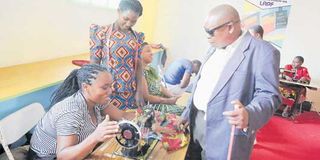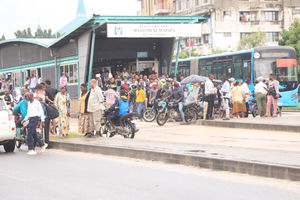Blind tailor who is giving back to the community

Nyangalio shares a light moment with one of his students at the training centre.
PHOTO | SAID HAMIS
What you need to know:
Wearing a cream shirt underneath a navy blue jacket, grey trousers, a tape measure around his neck and dark sunglasses, Nyangalio who is visually impaired moves around the class with the aid of a walking stick as he instructs his students.
At one of the stalls at the Saba Saba grounds in Dar es Salaam, 57-year-old Abdallah Nyangalio happily goes about his work, training students how to sew clothes.
Wearing a cream shirt underneath a navy blue jacket, grey trousers, a tape measure around his neck and dark sunglasses, Nyangalio who is visually impaired moves around the class with the aid of a walking stick as he instructs his students.
It’s amazing watching the way he interacts with the class, facing them as if he can see them. He cracks a joke here and there, making the students burst into laughter. He is such a talkative teacher with a good sense of humour and there is no mistaking the students enjoy being in his class.
Nyangalio was not born blind. The father of eight children lost his sight in his 30s after an operation to lower his eye pressure. The doctor told him before the surgery, that there was a risk he could lose his sight after the procedure, which is exactly what happened.
“At least the severe headache that I experienced as a result of the eye pressure stopped following the operation,” Nyangalio says jokingly, his voice implying he has since accepted his condition and moved on with life.
Nyangalio will always be grateful to the Russian doctor who performed the operation, one Dr Alexandra, who he later learnt had died, for teaching him how to make clothes. It’s because of her caring spirit that he is able to put food on the table today.
“As a way to thank God and the doctor, I decided to share my new skill with others,” says Nyangalio, happy that the job keeps him busy and because he earns a livelihood through it, he is not a burden to anyone. Although he does not earn much, he is satisfied with what he gets.
Nyangalio who has made clothes for the likes of former President Jakaya Kikwete and other dignitaries partnered with Buguruni ward councilor, Nuru Awadh and together they opened a training centre, Anaa Fashion Centre, situated at the Sabasaba International Trade Fair grounds.
The centre was launched last October by the then Temeke District Commissioner, Sophia Mjema. During the ceremony the DC donated two sewing machines to the centre. He thanks Tanzania Trade Development Authority (TanTrade) for their generous support. “The room I use as a classroom belongs to TanTrade and I don’t pay them a single cent. Not only that, TanTrade also gives me fare for coming here every day and back.”
On top of that, the organisation donated four sewing machines to the centre after which more support kept pouring in. The centre received ten sewing machines from Global Education Link and two more machines from the Minister of Finance and Planning, Hon Phillip Mpango. Today Anaa Fashion Centre owns a total of 17 sewing machines.
Urafiki Textile Mills also has been generous enough to support Nyangalio with materials, hence making his work easier.
Because of this support, 35 students have so far been equipped with clothes making skills. Currently, the centre has 21 students, the majority visually impaired. Nyangalio charges Sh20,000 per month for the three months course and offers the training free of charge for those who are visually impaired.
The eldest of four children in his family, Nyangalio lives in his parents’ home in Mbagala Kibonde Maji. Those who have seen his work call him Dr Nyangalio, a name he takes pride in. “People call me doctor because of my expertise in making clothes,” he says with a smile.
However, some people doubt his ability to make clothes since they can’t imagine how a person who cannot see can make a dress. Those who try him have never regretted, he says.
“Those who doubt my ability bring their children’s school uniforms to test me and end up bringing me materials to make them their own clothes,” he tells me.
Commenting on the business, Nyangalio says the market is not that good at the moment and that he only does good business during the saba saba trade fair.
Nyangalio calls upon people with disabilities to not despair but always believe in themselves. They should make the most of what life provides, he advises.



